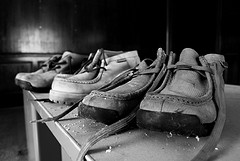My grandfather Robert was a large man, in many ways. He drank Coca-Cola, smoked too much, adored candy, ate liverwurst sandwiches with potato chips on top. He died of emphysema when I was in high school, before I got to the age when I could have straight-up conversations with him about the world. He was pretty bigoted, he spent money generously but not wisely, and I have no idea, really, what the heart of his relationship with my grandmother was like. I loved him deeply. He took me to the bookstore and introduced me to Agatha Christie and fantasy novels. He bought me honey-dipped fried chicken. He took me through the back door of his friend’s candy store where we could watch churning vats of fudge. He let me curl up on his big, warm belly, and he made me laugh.

Creative Commons image courtesy of Ashley.adcox on Flickr.
He had been a bus driver before retirement, and I grew up thinking he was the epitome of my family’s working class heritage. I wore his occupation proudly on my sleeve as I made my way through college and graduate school, studying “history from below.” It wasn’t until this past year, when I finally sat down to read, really read, a family history that he wrote for me before he died (“For Amy, because some day her name won’t be Robinson anymore, so she won’t forget”) that I realized that the working class story could not have emerged until after the Depression, when something happened, as it did to so many.
What happened seems to be that his family’s college-educated, engineering, and even artistic pedigree shriveled, right alongside most of the nation’s bank accounts. I am still not entirely sure of the details. He distanced himself from the events in a strange way by writing in the third person. Here is what his letter says, and how, in fact, it ends:
Beatrice and Robert became High School sweethearts—and after many trials & tribulations (Depression) were married— They first lived in New Haven, Conn., then things got rough & they moved around various places they could find a bed…finally they rented a house…[After my father and his brother were born] they had to get out of [there because] the owner wanted to live there—so they moved in with [family], they lived through Hell for several months then moved to their own place. From here on your father can tell the story.
Seventeen pages of family history, and just this one last, tightly compressed page on the “Hell” of the Depression and its aftereffects. The question that has been haunting me these past few days is this: is it possible that at some point during that intensely tumultuous, difficult time my grandfather might have needed to do something relatively harmless, but nonetheless illegal, in order to get by? Something like selling loose, untaxed cigarettes?
My grandfather was a large man, like Eric Garner. He smiled a lot, like Eric Garner. He went through rough times, like Eric Garner— not just rough individual times but rough times on a vast socio-economic level, out of his individual control. From the moment I first saw the video of Eric Garner’s death, and then photos of his life, he reminded me somehow of my grandfather. But if my grandfather had been harassed for doing something harmless but illegal, he would have been white, with the apparatus of a racist society behind him. And if he had been killed in the course of being harassed for doing something harmless but illegal, he would have been white, with the apparatus of a racist society behind him. This doesn’t guarantee that there would have been an uproar, or justice—class matters, too—but it certainly makes it more likely. True, I don’t know if my grandfather ever did anything harmless but illegal. Then again, I don’t know if Eric Garner did either, on July 17th of this year. Where are the cigarettes in that video footage? Where is his recourse to a fair trial? Dead, like my grandfather, except murdered on a sidewalk, and again behind locked doors, rather than in a hospital at an almost ripe old age. Dead, like too many ideas and hopes and dreams.
All I want to do is to be able to stand in other people’s shoes, to understand the truth of their lives. I do think my grandfather’s story, and that wooden-floored, dusty bookstore we visited together, might have something to do with that. So I am thankful for what he offered me. But a big part of me, today, wants to wake him from the dead, shake him, and say, “Granddad, stand in Eric Garner’s shoes! Tell me what you learn, and what you feel! And then ask your bus driver and city hall and policemen buddies to do it, too!”
But I can’t. I can’t make anyone come alive.
What I can say, in full awareness that words are inadequate to the moment, is this: may the suffering end, may all beings be free. In my grandfather’s family, and Eric Garner’s family, and Michael Brown’s, Tamir Rice’s, Andy Lopez’s, Alex Nieto’s, in the families of all the victims of police violence whose names I do not know, and yes, in Daniel Pantaleo’s family—whatever tumultuous, difficult history it holds—too.


